初中英语讲义北师大版初三英语第5讲:unit 3 词汇篇(教师版)-顺义段晓波
初三英语复习Unit 5知识精讲 北师大版

初三英语复习Unit 5知识精讲北师大版【本讲教育信息】一. 教学内容:复习Unit 5二. 具体内容:(一)unit5 词组1. be used as2. be used by3. in education4. in public affairs5. what is more6. apart from7. do well on the test8. depend on9. give up10. look forward to doing11. call for help12. arrive in13. take some French land14. fight against each other15. in the center of16. in the north of17. consist of18. to one’s right19. draw visitors from all over the world20. on one’s left21. open…to the public22. get married23. up ahead24. make sb. do25. talk to/with26. find…helpful27. on my own28. read a lot in English29. grow up(二)能力练习:I. 感叹句单项选择:1. fast the boy runs!A. WhatB. HowC. What aD. How a2. interesting story book it is!A. What aB. What anC. How aD. How an3. beautiful the Summer Palace is!A. HowB. WhatC. How aD. What a4. tall buildings they are!A. HowB. WhatC. What aD. How a5. kind the Chinese people are!A. WhatB. What aC. HowD. How a6. hard all the farmers are working!A. WhatB. HowC. What aD. How a7. bad weather it is! We can’t go for a walk.A. What aB. HowC. WhatD. What an8. honest boy he is!A. How aB. How anC. What aD. What an9. Look! fine weather we have these days!A. What aB. How theC. WhatD. How10. The sun is shining. fine day it is!A. HowB. How aC. WhatD. What a11. heavily the rain is falling!A. What aB. WhatC. How aD. How12. Look at the man over there. he is!A. How tallB. How highC. What a tallII. 完成句子:(反意疑问句)1. It was cold yesterday, ?2. He won’t be away for a long time,?3. My brother could hardly believe his own eyes,?4. Don’t talk in class,?5. She said nothing at that moment,?6. Let’s go and see him,?7. Let us play football on the playground,?8. I don’t think you’re right,?9. He thinks she will be here on time,?10. There’s little water in the glass,?11. His sister speaks French,?12. I think he is a nice boy,?III. 选词填空1. Would you like _______ bread? Thank you. I’m full.2. They were all very tired, but _______ of them would stop to have a rest.3. He has two friends. One is Lucy, ________ is Henry4. We’ve got two TV sets, but _________ works well.5. Which is more useful, biology or chemistry? I think ______of them are useful.6. How often are the Olympic Games held? ______ four years.7. It was a long journey, but ______of them felt boring.8. I can’t finish it on time. I need _______ two days.IV. 用who, which, whose, when, where, that填空。
北师大版初三英语第5讲:unit 3 词汇篇(学生版)
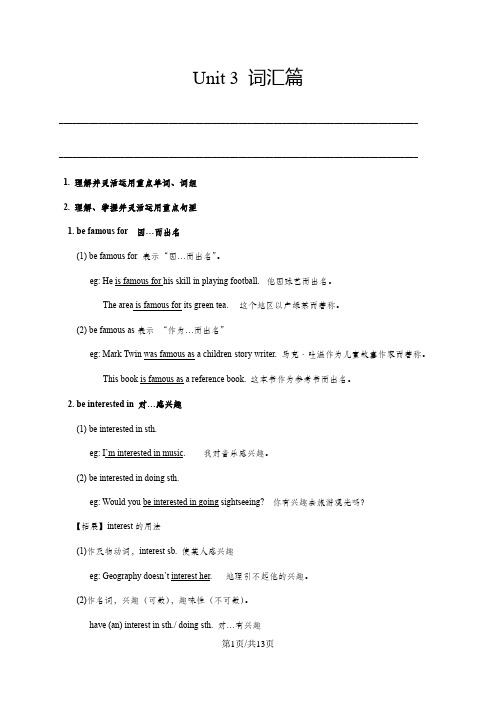
Unit 3 词汇篇____________________________________________________________________________________________________________________________________________________________________1. 理解并灵活运用重点单词、词组2. 理解、掌握并灵活运用重点句型1. be famous for 因…而出名(1) be famous for 表示“因…而出名”。
eg: He is famous for his skill in playing football.他因球艺而出名。
The area is famous for its green tea.这个地区以产绿茶而著称。
(2) be famous as表示“作为…而出名”eg: Mark Twin was famous as a children-story writer.马克·吐温作为儿童故事作家而著称。
This book is famous as a reference book.这本书作为参考书而出名。
2. be interested in 对…感兴趣(1) be interested in sth.eg: I’m interested in music. 我对音乐感兴趣。
(2) be interested in doing sth.eg: Would you be interested in going sightseeing? 你有兴趣去旅游观光吗?【拓展】interest的用法(1)作及物动词,interest sb. 使某人感兴趣eg: Geography doesn’t interest her. 地理引不起他的兴趣。
(2)作名词,兴趣(可数),趣味性(不可数)。
have (an) interest in sth./ doing sth. 对…有兴趣eg: He has great interest in the meeting. 他对这个会议有很大兴趣。
北师大版初二(上)英语第5讲:unit 3 词汇篇(教师版)
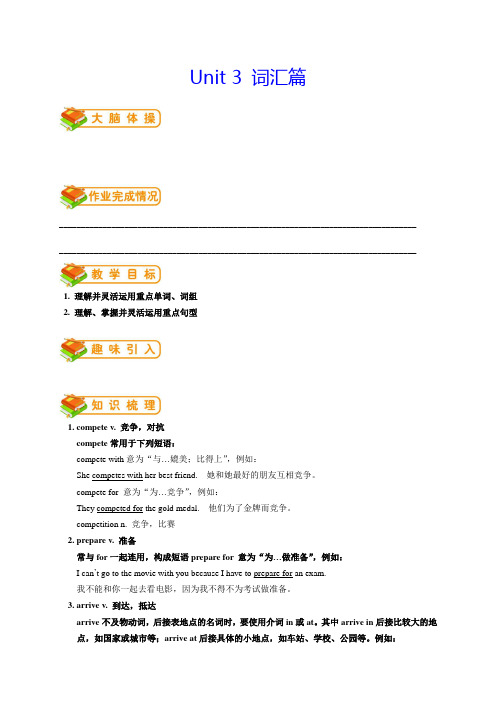
Unit 3 词汇篇____________________________________________________________________________________________________________________________________________________________________1. 理解并灵活运用重点单词、词组2. 理解、掌握并灵活运用重点句型1. compete v. 竞争,对抗compete常用于下列短语:compete with意为“与…媲美;比得上”,例如:She competes with her best friend. 她和她最好的朋友互相竞争。
compete for 意为“为…竞争”,例如:They competed for the gold medal. 他们为了金牌而竞争。
competition n. 竞争,比赛2. prepare v. 准备常与for一起连用,构成短语prepare for 意为“为…做准备”,例如:I can’t go to the movie with you because I have to prepare for an exam.我不能和你一起去看电影,因为我不得不为考试做准备。
3. arrive v. 到达,抵达arrive不及物动词,后接表地点的名词时,要使用介词in或at。
其中arrive in后接比较大的地点,如国家或城市等;arrive at后接具体的小地点,如车站、学校、公园等。
例如:He arrived in England last week. 他上周抵达英国。
When did you arrive at the bus station. 你什么时候到达公共汽车站的?4. spend v. 花费过去式、过去分词spent, spent 主语是人spend some time /some money on sth. 花时间/钱在某事上spend some time /some money (in) doing sth. 花时间/钱做某事例如:I spent 10 dollars on the book. / I spent 10 dollars (in) buying the book.我花10美元买了这本书。
北师大版八年级(下)英语第5讲:Unit3词汇篇
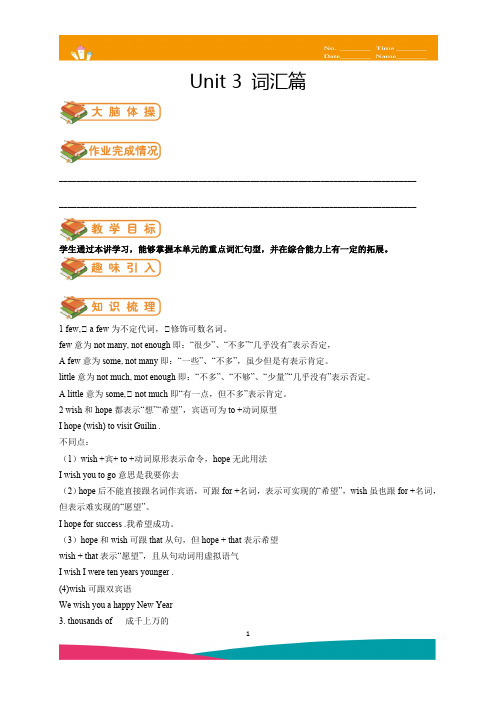
1Unit 3 词汇篇__________________________________________________________________________________ __________________________________________________________________________________学生通过本讲学习,能够掌握本单元的重点词汇句型,并在综合能力上有一定的拓展。
1 few, a few 为不定代词, 修饰可数名词。
few 意为not many, not enough 即:“很少”、“不多”“几乎没有”表示否定,A few 意为some, not many 即:“一些”、“不多”,虽少但是有表示肯定。
little 意为not much, mot enough 即:“不多”、“不够”、“少量”“几乎没有”表示否定。
A little 意为some, not much 即“有一点,但不多”表示肯定。
2 wish 和hope 都表示“想”“希望”,宾语可为to +动词原型I hope (wish) to visit Guilin .不同点:(1)wish +宾+ to +动词原形表示命令,hope 无此用法I wish you to go 意思是我要你去(2)hope 后不能直接跟名词作宾语,可跟for +名词,表示可实现的“希望”,wish 虽也跟for +名词,但表示难实现的“愿望”。
I hope for success .我希望成功。
(3)hope 和wish 可跟that 从句,但hope + that 表示希望wish + that 表示“愿望”,且从句动词用虚拟语气I wish I were ten years younger .(4)wish 可跟双宾语We wish you a happy New Year3. thousands of 成千上万的2数词修饰hundred ,thousand 等时,hundred ,thousand 后面不能加‘s’,也不能后面加‘of’4 go for a picnic 去野炊5 worry about 担心1.He __________to give his best________ to you.A . wishes; wishB .hopes; wishesC .wish; wishesD .hope; wish2. You look ____________.What do you________________?A .worry; worry aboutB .worry; worried aboutC .worried; worry aboutD .worried; worried about3 --- Would you like to go _________a picnic ________this Sunday?--- Yes, I'd love to.A . for; onB .to; /C .for; /D .to; on4.The doctor said my leg would be better in _________ days.A . a lotB .oneC .a fewD .a little5.The girl won ____________ dollars in the lottery.A .a millionB .millionsC .millions ofD .two millions解析:1. 本题第一空hope to do 第二空wish 为名词愿望,故选 B 。
九年级教材辅导Unit5
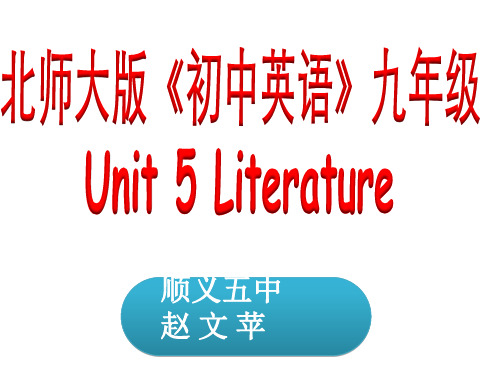
Para 5: two braids of red hair, small and thin face, big green eyes; old brown hat
Para 5: ...look back... Para 6: as soon as she saw... Para 10: ...talked on and on...
顺义五中 赵文苹
整体了解第五单元(4 skills)
L 13 L15 L 14
CW
L 15,P58: A Famous Writer
L 1
P53:Getting Ready P56: L 14
三类词汇
A:many kinds of books B:telling stories C:reading books D:books about ancient stories 四幅图片以不同的形式 导入本单元的主题 books----literature
引导学生进一步了解并学习赏析文学作品。
第一课时:侧重培养学生的文学赏析的能力。 通过阅读活动,引领学生根据不同的层面的细节描写 来分析人物性格,关注课文所承载的人文性,感受经 典文学作品的魅力,并激发进一步阅读这本小说的兴趣。
读前:Have you ever read about this story?
silence. He reached Bridge River but there was no sign of the 5:30 train which he’d come for. Matthew asked the station manager if it would come soon.
所著小说Anne of Green Gables的第二章,讲述了沉默寡 言的马修想领养一个男孩,到车站才发现来的是一个女孩, 善良的马修被乐观聪明喋喋不休的安妮所打动,最终把她 带回家。
北师大版英语九年级全册Unit 5单词及短语
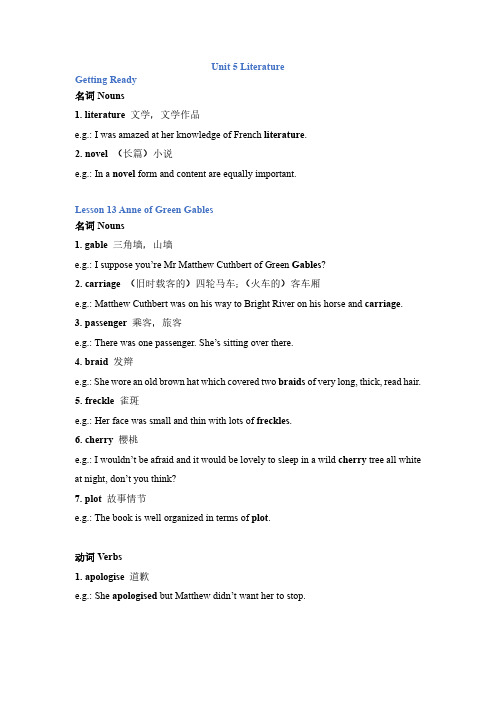
Unit 5 LiteratureGetting Ready名词Nouns1. literature文学,文学作品e.g.: I was amazed at her knowledge of French literature.2. novel(长篇)小说e.g.: In a novel form and content are equally important.Lesson 13 Anne of Green Gables名词Nouns1. gable三角墙,山墙e.g.: I suppose you’re Mr Matthew Cuthbert of Green Gables?2. carriage(旧时载客的)四轮马车;(火车的)客车厢e.g.: Matthew Cuthbert was on his way to Bright River on his horse and carriage.3. passenger乘客,旅客e.g.: There was one passenger. She’s sitting over there.4. braid发辫e.g.: She wore an old brown hat which covered two braids of very long, thick, read hair.5. freckle雀斑e.g.: Her face was small and thin with lots of freckles.6. cherry樱桃e.g.: I wouldn’t be afraid and it would be lovely to sleep in a wild cherry tree all white at night, don’t you think?7. plot故事情节e.g.: The book is well organized in terms of plot.动词Verbs1. apologise 道歉e.g.: She apologised but Matthew didn’t want her to stop.形容词Adjectives1. lovely 可爱的;令人愉快的e.g.: We’re blessed with five lovely grandchildren.副词Adverbs1. shyly 羞怯地e.g.: “I’m sorry I’m late,” he said shyly.2. normally通常,正常情况下e.g.: Normally, too much talking would make Matthew angry, but from Anne, he didn’t mind.短语Expressions1. make up one’s mind 决定,下定决心e.g.: If you didn’t come for me tonight, I made up my mind to go down the road to that cherry tree at the corner, climb up it and stay all night.Lesson 14 The Dark Room名词Nouns1. trunk象鼻;树干e.g.: One of them touched the trunk of the elephant.2. tusk(象或某些动物的)长牙e.g.: Elephants wear the tusk down faster than they can grow it.3. hose橡皮管e.g.: He thought the elephant was like a hose.4. iron铁e.g.: Iron reacts with water and air to produce rust.5. mat小地毯,垫子e.g.: Please wipe your feet on the mat.6. king国王e.g.: The king’s officers argued about many things, even about small things.7. officer官员;军官e.g.: One day, the king asked his officers to come to the palace.8. cloth布;布料e.g.: He covered the officers’ eyes with cloth and led them into a dark room.9. guard卫兵,警卫e.g.: The king’s guards put each officer in a different spot.10. spot地点;斑点e.g.: He showed me the exact spot where he had asked her to marry him.11. jacket夹克衫e.g.: It’s clearly your jacket.形容词Adjectives1. thick 粗的;厚的e.g.: Everything was covered with a thick layer of dust.副词Adverbs1. obviously 明显地,显然e.g.: It’s obviously a rope.介词Prepositions1. upon 当……时;在……上e.g.: He set the tray upon the table.兼类词Words with Multiple Part of Speech1. flat adj.扁平的n.公寓e.g.: Do you live in a flat or a house?短语Expressions1. once upon a time 很久以前e.g.: Once upon a time there was a king.Lesson 15 A Famous Writer名词Nouns1. series系列e.g.: Her Harry Potter series was completed with its final book in 2007.2. graduation毕业e.g.: Seven years after my graduation, I had failed on an epic scale.3. scale程度e.g.: It was impossible to comprehend the full scale of the disaster.4. marriage婚姻e.g.: In 1993, her first but short marriage ended.5. resolution结果;解决e.g.: That period of my life was a dark one and I had no idea that there was going to bea kind of fairytale resolution.6. carelessness疏忽大意e.g.: Most of your mistakes are related to your carelessness.动词Verbs1. raise 抚养;提升e.g.: She had no job and had to raise her daughter alone.2. pretend假装e.g.: Failure meant I stopped pretending to myself that I was anything other than what I was and began to direct all my energy into finishing the only work that really mattered to me.3. remarry再婚e.g.: She has also remarried and now has three children.4. separate分离;划分e.g.: She separated from her husband.形容词Adjectives1. epic 巨大的e.g.: Their epic fight is the subject of a new film.2. usual寻常的,通常的e.g.: She went on to say that “by every usual standard, I was the biggest failure I knew.”3. rich富有的e.g.: As we all know now, the Harry Potter books went on to become extremely successful and also made J.K Rowling very rich.4. final最终的,最后的e.g.: The project is in its final stages.5. related相关的,有联系的e.g.: Much of the crime in this area is related to drug abuse.兼类词Words with Multiple Part of Speech1. direct adj.直接的v.投入e.g.: She thinks it is a direct result of her early failures.短语Expressions1. other than 除……之外;不同于e.g.: I don’t know any American people other than you.2. theme park主题公园e.g.: The books have become a very successful film series and three years after the final book was published, a Harry Potter theme park opened in the United States.3. related to与……相关的e.g.: She has written other books related to the Harry Potter series.Communication Workshop名词Nouns1. climax高潮;顶点e.g.: The music builds up to a rousing climax.动词Verbs1. celebrate 庆祝,祝贺e.g.: I went to her home in the evening to celebrate.2. rush迅速移动e.g.: I quickly put on my uniform and rushed to school.短语Expressions1. enjoy oneself 过得愉快e.g.: We all enjoyed ourselves a lot and stayed until very late.。
最新北师大版九年级英语下册Unit5EnglishandEnglish-speakingCountries精品教案(3)
Unit 5 English and English-speaking Countries【本讲教育信息】一. 教学内容:复习Unit 5二. 本周教学重点:1、复习定语从句2、复习反意疑问句3、复习感叹句三. 具体内容:(一)Attributive clauses用定语从句为主句补充信息。
The building which is on the corner was built one h undred years ago.The king of England was the person who built this castle.The man whose wife works there is a friend of mine.The things that they call chips, we call French fries.(二)Tag questions 反意疑问句用反意疑问句确认某件事或征询意见You enjoy your cl asses, don’t you?He didn’t complete the course, did he?They haven’t been here before, have they?He never reads storybooks, does he?It would cost a lot of money, wouldn’t it?(三)Exclamatory Sentences用感叹句表示惊讶、羡慕等情感。
How difficult the text is!How hard the students work!What a fine day it is!(四)词组:Lesson 171. on the Internet2. in English3. speak English4. two thirds5. be used for doing sth.6. official language7. native lan guage8. give sth. to sb. /sb. sth.9. take part in10. what is more11. apart from12. for sure13. be different fromLesson 19.1. each other2. depend on3. talk to sb.4. look forward to sth./doing sth.5. in the north6. play against7. give up doingLesson 201. consist of2. on the left3. most of4. be over5. at that moment6.grow up7.get married8. be open to the publicExpansion 51. at the crossroads2. expect to do sth.3. put away4. put on5. put up6. take down7. take off8. put off【典型例题】I. 单项选择和填空。
初中英语讲义北师大版初三英语第3讲:unit 2 词汇篇(学生版)-顺义段晓波
Unit 2 词汇篇____________________________________________________________________________________________________________________________________________________________________1. 理解并灵活运用重点单词、词组2. 理解、掌握并灵活运用重点句型1.be used to doing 习惯做某事sb. be/get used to doing sth. 某人习惯做某事sth. be used to do sth. 某物被用来做某事eg: He is used to living in the village. 他习惯生活在乡村里。
Clothes are used to keep warm. 衣服是用来保暖的。
be used to doing与used to do的区别be used to doing表示习惯做某事,to为介词后面加动词-ing形式;used to do sth.过去常常做某事,to 后面接动词原形。
eg: He is used to swimming in winter. 他习惯冬泳。
He used to swim in winter. 他过去常常冬泳。
2.have trouble (in) doing 在做某事上有(困难)have problems/ trouble/ difficulties (in) doing 在做某事时有问题/麻烦/困难。
其中problems/trouble/ difficulties三个词意义相近,可以互换。
介词in可省略。
eg: Did you have problems (in) talking with people when you were in China?当你在中国的时候,与人交谈有问题吗?The boy has much trouble (in) reciting words. 这个男孩在背单词上有很大的问题。
外研-九年级上册讲义-教师版-Module5
Module 5 Museums【新手目标】通过本关,你能够听懂谈论某处相关规则的对话。
关卡1 Unit1 Don’t cross that rope!【过关笔记】(Betty, Lingling and Daming are on the second floor of a museum.)Betty: What a wonderful museum!Lingling: It's great, isn't it? Let's go to the Animal Room upstairs. I need some information for my project.Betty: Me too. Let's go. Wait, where's Daming?Lingling: There he is. What's he doing over there?Daming : Hey, Betty! Lingling! e and see the monkey exhibition!Guard: No shouting, please! It's against the rules.Betty: Oh, no! Daming is in trouble again.Daming: Look at the monkey's tail! I've got to get in here…Gard: Stop! Don't cross that rope! Can't you see the sign, kid? "No entry."Daming: Oh. Why not?Guard: Because it's closed.Lingling: Yes, Daming. Read the sign!Daming : Oh, right. That's no good! Well, I'll just take a photo...Guard: Sorry. No photos. See?Daming: There certainly are a lot of rules in this museum. No wonder the place is empty!Betty: Daming! Don't be rude!Lingling: Oh, no!Betty: What's the matter, Lingling?Lingling: My mobile phone! It’s missing! Oh, no! What am I going to do?Guard: Don't worry, Miss. Go downstairs to the lost and found office. They might have it.Lingling: That phone is new! I have to find it, or Mum will punish me!Betty: I'm sure it will be all right, Lingling. Let's go and see.Daming:Yes, let's go downstairs.【成长例题】一.单项选择CDACC, CCCAC, DD例题1._________ buy your ticket from a ticket machine. There are lots of people there.A.NotB.Not toC.Don'tD.Don't to 例题2.__________ you're so thin, you eat so little.A.No ideaB.No goodC.No matterD.No wonder 例题3.Which of the following signs means "No photos"?A B C D例题4.— Look at the sign!— Oh, I see. We ________________ waste water.A.canB.mustC.mustn'tD.needn't 例题5.— Excuse me, where can I park my car?— Drive ahead, and you will see the sign_____ on your right.A. B. C. D.例题6.—All of the soldiers were busy saving the wounded people after the earthquake, with no rest.—________ they looked so tired.A.I wonderB.It seemedC.No wonderD.I bet 例题7.Andy makes few spelling _______ careful boy he is!A.WhatB.What anC.What aD.How 例题8.Ben was helping his mother when the rain began to beat heavily ________ the windows. A.below B.across C.against D.behind 例题9.It seems that it is going to rain. You'd better ________ the windows open when you leave the house.A.not leaveB.leaveC.not to leaveD.to leave 例题10.— I really hope to keep in touch with Lily.— Sorry, I don't know ____________.A.what her name isB.what her job isC.what her number isD.when she left例题11.—I hear Linda's cat went ________last night.—Oh,I'm sorry to hear that. Has she found it?A. crazyB. badC. hungryD. missing例题12.—Toby,it's time to go to bed. It's already 11:30 pm.—Oh,I can't. If I can't manage to finish the work tonight,I'll be________.A. in timeB. in piecesC. in personD. in trouble【过关练习】一、根据句意用所给词的适当形式填空【答案】1.exhibitions练习1. There are two interesting ____________(exhibition) in the museum these days.练习2. I can't find my pen. It's __________(miss).练习3. Yesterday the teacher __________(punish) Bill for being late for school.练习4. Dad bought some __________(rope) in the supermarket.练习5. My brother Tony is good at ________ (study) maths.练习6.If you feel tired, (stop) to have a rest.练习7.Look at the sign “No(swim)”.练习8.You can’t go to the shop to buy things now, because it is (close).练习9.They are on the (two) floor of the Science Museum.练习10.Children, (not look) out of the window!3.punished4.ropes5.studying6.stop7.swimming8.closed9.second 10.don’t look 二.根据汉语意思完成句子,每空一词练习1. 当你处于困境时, 请给我打。
北师大版初中英语九年级上册Unit 5 Literature 词汇精讲
Unit 5 Literature词句精讲精练:【词汇精讲】1. enjoyenjoy sth. 意为“喜爱某物”,后面接名词、代词作宾语。
例如:She enjoys oranges very much.她非常喜欢橘子。
【拓展】(1)enjoy oneself(enjoy 后接反身代词作宾语),意为“玩得高兴”,相当于have a good time。
例如:They enjoyed themselves last night.昨天晚上他们玩得很高兴。
We enjoyed ourselves at Jim’s birthday party.在吉姆的生日晚会上我们过得很愉快。
(2)enjoy doing sth. 喜爱做某事,后面接动名词作宾语。
例如:Those girls enjoy playing the piano.那些女孩非常喜欢弹钢琴。
2. reachreach是及物动词,可以直接接宾语。
例如:I’ll call you as soon as I reach New York. 我一到达纽约就给你打电话。
【拓展】表示“到达”的词汇还有arrive in(at); get to。
(1)arrive意为“到达……”,是不及物动词。
后接表示地点的副词时,只能用arrive。
而arrive in后接表示范围较大的地点名词(如country, city等);arrive at后接小地点(如school, hotel, stop等)。
例如:He arrives at school at eight every morning. 他每天早上八点到达学校。
Her father arrived in Shanghai yesterday. 她父亲昨天到达上海。
(2)get to 意为“到达……”。
其后接表示地点的副词(如here; there; home等)时,介词to要省略。
例如:They’ll get to Beijing at six tonight.他们将在今晚六点到达北京。
- 1、下载文档前请自行甄别文档内容的完整性,平台不提供额外的编辑、内容补充、找答案等附加服务。
- 2、"仅部分预览"的文档,不可在线预览部分如存在完整性等问题,可反馈申请退款(可完整预览的文档不适用该条件!)。
- 3、如文档侵犯您的权益,请联系客服反馈,我们会尽快为您处理(人工客服工作时间:9:00-18:30)。
Unit 3 词汇篇____________________________________________________________________________________________________________________________________________________________________1. 理解并灵活运用重点单词、词组2. 理解、掌握并灵活运用重点句型1. be famous for 因…而出名(1) be famous for 表示“因…而出名”。
eg: He is famous for his skill in playing football. 他因球艺而出名。
The area is famous for its green tea. 这个地区以产绿茶而著称。
(2) be famous as表示“作为…而出名”eg: Mark Twin was famous as a children-story writer. 马克·吐温作为儿童故事作家而著称。
This book is famous as a reference book. 这本书作为参考书而出名。
2. be interested in 对…感兴趣(1) be interested in sth.eg: I’m interested in music. 我对音乐感兴趣。
(2) be interested in doing sth.eg: Would you be interested in going sightseeing? 你有兴趣去旅游观光吗?【拓展】interest的用法(1)作及物动词,interest sb. 使某人感兴趣eg: Geography doesn’t interest her. 地理引不起他的兴趣。
(2)作名词,兴趣(可数),趣味性(不可数)。
have (an) interest in sth./ doing sth. 对…有兴趣eg: He has great interest in the meeting. 他对这个会议有很大兴趣。
(3) interesting adj. 有趣的,令人感兴趣的interested adj. 对…感兴趣的interesting 主语为物,interested主语为人。
eg: The story is very interesting. 这个故事很有趣。
John is interested in drawing pictures. 约翰喜欢画画。
3. hundreds of 数以百计的,成百上千的hundreds of+ 可数名词复数;但hundred与具体数字连用时用单数。
eg: Hundreds of people were flooded out when the river burst its banks.洪水决堤时,好几百人被迫流离失所。
The farmer keeps three hundred pigs on his farm.那个农场主在农场里养了三百头猪。
4. the number of …的数量(1) the number of 表示“…的数量”,与复数名词连用作主语时,中心词是number,谓语动词用单数。
eg: The number of the students in our class is 50. 我们班学生的数量是50人。
(2) a number of 表示“许多”,相当于many,修饰可数名词复数。
作主语时谓语动词用复数。
number前面可用large, small修饰,表示程度。
eg: A number of students are planting trees in the hill. 许多学生在小山上植树。
5. as well as 和…一样好;也;还有(1) 和…一样好eg: He speaks French as well as English. 他的法语讲得和英语一样好。
(2) 也,不但…而且eg: He can speak French as well as English. 他不但会讲法语还会说英语。
6. provide 提供provide sth. for sb. / provide sb. with sth. 两者意思相同,“给某人提供某物”,但介词不可混淆。
eg: They provided some necessary support for the sufferers.They provided the sufferers with some necessary support.他们为受难者提供了一些必要的援助。
7. benefit from 得益于benefit的用法(1) 用作动词,与from连用,意思为“获益,得益于”。
eg: The plants benefited from the rain. 植物得益于这场雨。
(2) 用作名词,意思为“利益,好处”。
eg: It is said Yogo is of great benefit to human health. 据说瑜伽对人们健康有极大益处。
8. ahead of…早于;在…前面(指在空间或时间上)早于;在…前面;处于领先地位;比…先进;领先eg: He is always ahead of the age. 他总是走在时代的前面。
He is ahead of me in English. 他英语比我强。
The work was done ahead of time. 工作提前完成了。
Mary finished her job ahead of schedule. 玛丽提前完成了工作。
9. one of + the + 形容词最高级+ 名词复数最…之一eg: China is one of the oldest countries in the world. 中国是世界上最古老的国家之一。
Beijing is one of the biggest cities in China. 北京市中国最大的城市之一。
10. so that 如此…以致于(1) 引导结果状语从句eg: He is so kind that we all like him. 他如此和蔼,我们都很喜欢他。
(2) 引导目的状语从句eg: I came here so that I could take some pictures of the beautiful leaves.我来这儿,为的是能拍一些漂亮树叶的照片。
so that引导目的状语从句时一般连在一起用,从句由情态动词加实义动词构成谓语,表示目的。
1. It took ___________people three months to build this great building.A. two hundredsB. two hundred ofC. hundred ofD. hundreds of2. ---Many teenagers put mobile gaming______ other things and spend too much time on it.---That’s really bad.A. up toB. as forC. ahead ofD. along with3. ---How many girls are there in your class?---__________of them______ twenty.A. A number of; areB. The number of; areC. A number of; isD. The number of; is4. --- Do you know about Florence Nightingale?---Yes, she was well-known _______ a nurse in England _______ her kindness to the sick and thewounded soldiers.A. as; asB. for; asC. to; forD. as; for5. Da Vinci was _________ in science and art, and he was a pioneer in many areas.A. interestedB. interestC. interestingD. interests6. He was one of ______________.A. the greatest painterB. the greatest paintersC. greatest painterD. greatest painters7. He said his success ____________ his mother’s continuous encouragement.A. benefit fromB. benefited fromC. benefits fromD. benefited by8. Her parents provided her__________ food and clothes in the university.A. withB. forC. inD. by解析:1.本题题意为“建造这个伟大的建筑用了好几百人三个月的时间”,hundreds of表示数以百计,hundred 和具体数字连用时用单数,故选D。
2.根据选项可知,本题题意为“许多青少年把手机游戏放在其他事情的前面,并且花很多时间在上面”put sth ahead of sth. 把某事放在某事的前面,故答案为C。
3. 上文问题为“班里有多少女生?”,回答应为女生的数量是20人,the number of表示...的数量,谓语动词用单数,故选D。
4. 上文问题为“你知道南丁格尔吗?”下文回答为“她作为一名护士因为对病人和伤员的善良和仁慈而出名。
”be famous as作为... 有名;be famous for因...出名。
故选D。
5. 根据固定搭配be interested in sth., 可知答案选A。
6. one of + 形容词的最高级+ 可数名词复数,表示最...之一,形容词最高级前要加the,题意为“他是最伟大的画家之一”,故选B。
7. 固定搭配benefit from,得益于;题意为“他说他的成功得益于母亲不断的鼓励”;said为过去式,宾语从句“主过从过”,故选B。
